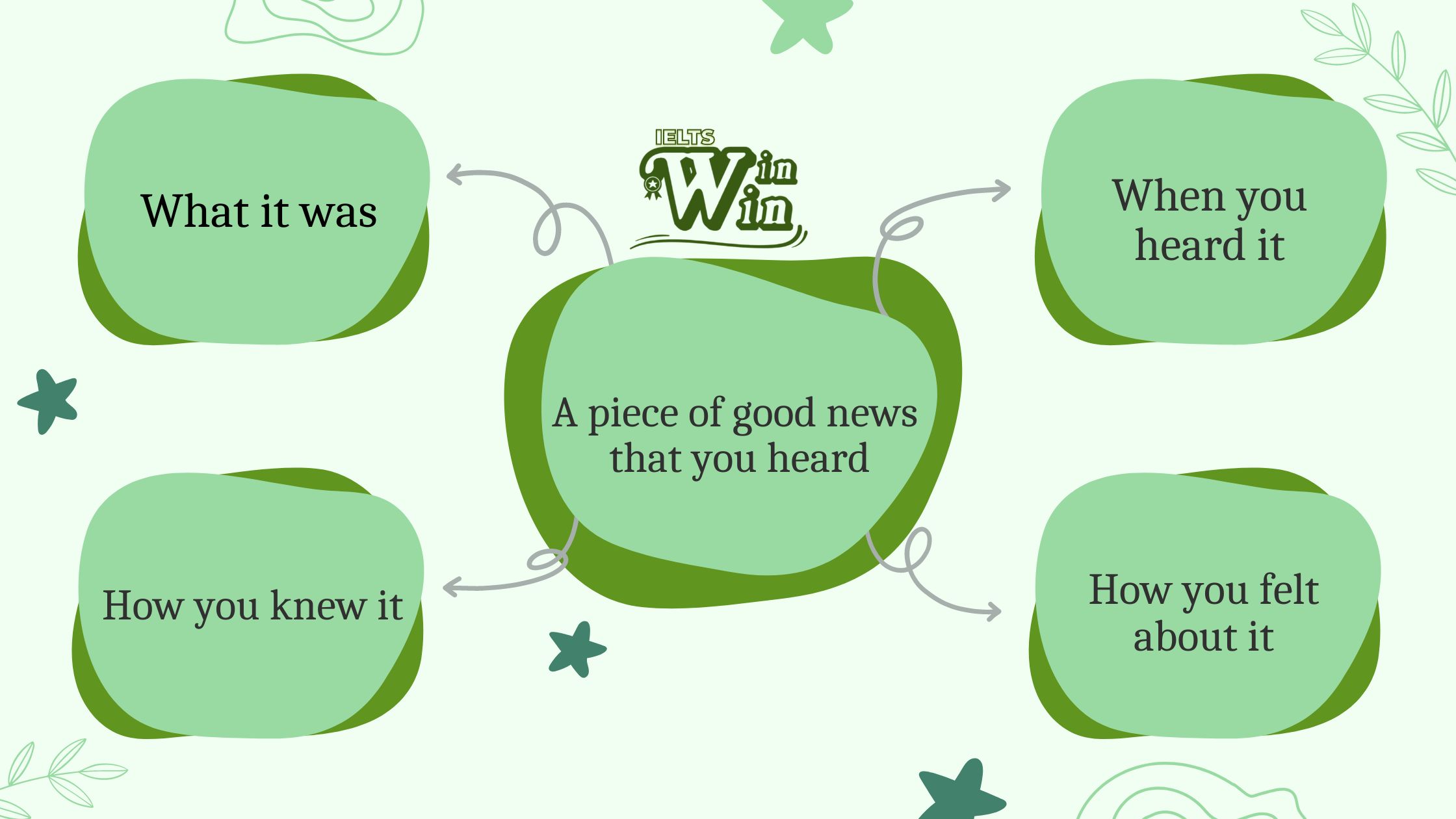✨ Part 2: Describe a piece of good news that you heard about someone you know well.
You should say:
- what it was
- when you heard it
- how you knew it
- explain how you felt about it
Recently, I received some great news from my best friend, Kyle, who has just been accepted into his dream university in Australia.
I’ve known Kyle since middle school and we have been through many ups and downs together. And of course, I’m well aware of his dream to attend one of the top 8 universities in Australia, and I also know how hard he has worked to achieve his goal of being accepted. I have seen him staying up till 2 or 3 in the morning to study on many occasions, and participating in after-school activities to bolster his profile for his uni application. Just a week ago, Kyle called me while I was still in bed to share the good news of his acceptance. I was thrilled for him and jumped out of bed with excitement. The joy and relief in his voice were palpable, and I knew how much effort and dedication he had put into his academics and extracurricular activities to make this achievement possible. The fact that he also received a 50% tuition fee scholarship made me even more proud of him. That entire morning was one of the greatest moments of my life because I had the opportunity to witness my best friend take his first step towards success. I congratulated him, and we made plans to celebrate together. He truly deserves all the recognition and admiration from everyone.
Hearing about Kyle's success filled me with happiness and pride. He is a fantastic role model for me to stay focused and work hard to achieve my own goals. While I'm sad that we'll have to say goodbye soon as he heads off to Australia, I'm looking forward to staying in touch and seeing all the amazing things he'll achieve in the future.
- Ups and downs: /ʌps ənd daʊnz/ (n) - thăng trầm, biến động
- Bolster: /ˈbəʊlstər/ (v) - tăng cường, củng cố
- Palpable: /ˈpælpəbl/ (adj) - có thể cảm nhận được, rõ ràng
- Extracurricular: /ˌekstrəkəˈrɪkjʊlər/ (adj) - ngoại khóa, ngoài chương trình học
- Recognition: /ˌrekəɡˈnɪʃn/ (n) - sự công nhận, sự thừa nhận
PART 3
✨How do most people get their news in your country?
In Vietnam, the Internet has become a major source of news for most people. They rely on online news websites and social media platforms accessed through their mobile devices to keep up with the latest events. However, many other people still prefer traditional news sources such as TV news programs or print newspapers. These sources are considered more credible, as they undergo authority approval before publication, and offer 24-hour news coverage.
- Credible: /ˈkredəbl/ (adj) - đáng tin cậy, có thể tin tưởng
- Undergo: /ˌʌndəˈɡəʊ/ (v) - trải qua, chịu đựng
- Authority approval: /ɔːˈθɒrəti əˈpruːvəl/ (n) - sự chấp thuận của chính quyền
- Coverage: /ˈkʌvərɪdʒ/ (n) - phạm vi bao phủ, độ phủ sóng
✨How do you think people will get their news in the future?
I reckon that smartphones and mobile devices are taking over, which means digital news sources are gonna be the main way people get their news in the future. Thanks to advancements in technology, we’ll be able to customize our news feeds based on what we're interested in. These digital news sources are also highly accessible, as people can simply turn on their phones to access the latest news updates without having to wait for a specific TV news program or purchase a physical newspaper.
- Reckon: /ˈrekən/ (v) - tính toán, đánh giá
- Advancements: /ədˈvɑːnsmənts/ (n) - sự tiến bộ, sự phát triển
✨Do you believe everything you read in the newspapers?
No, I don’t automatically believe everything I read in newspapers. I tend to approach information with discernment, regardless of how reliable it is. While newspapers are a legitimate source of valuable information, I typically verify any claims made in their articles before accepting them as true. This is because some journalists may distort information to manipulate the public, either to generate interest or to serve their own interests.
- Discernment: /dɪˈsɜːnmənt/ (n) - sự nhận thức, sự phán đoán
- Legitimate: /lɪˈdʒɪtəmət/ (adj) - hợp pháp, chính đáng
- Distort: /dɪˈstɔːt/ (v) - bóp méo, xuyên tạc
- Manipulate: /məˈnɪpjʊleɪt/ (v) - thao túng, điều khiển
✨How has social media changed the way we get and share the news?
The advent of social media has dramatically altered how we access and share the news. Back in the day, we relied on old-school media like newspapers, TV, and radio, or passed information through word of mouth. Today social media platforms such as Facebook, Twitter, and Instagram have become primary sources of news. This shift has made it possible for news to spread rapidly on social media, reaching more people faster than ever before. But the flip side is that fake news or misinformation can also run rampant in the media, which can create confusion and undermine people’s trust in news sources.
- Advent: /ˈædvənt/ (n) - sự xuất hiện, sự đến
- Altered: /ˈɔːltəd/ (adj) - thay đổi, đã được sửa đổi
- The flip side: /ðə flɪp saɪd/ (n) - phía bên kia, hậu quả phụ
- Rampant: /ˈræmpənt/ (adj) - lan tràn, hoành hành
✨Do you think printed newspapers will disappear in the future?
Printed newspapers will definitely become obsolete in the future if the consumption of digital media continues to thrive. The fact that fewer people are reading and paying for traditional print newspapers is proof that more and more folks are getting their news online. While some newspapers have attempted to adapt to the digital age by creating online versions of their publications, many others have gone out of business due to unaffordable ongoing costs. That's why it's totally possible that someday we won't have any more physical newspapers left.
- Obsolete: /ˌɒbsəˈliːt/ (adj) - lỗi thời, cổ xưa
- Consumption: /kənˈsʌmpʃn/ (n) - sự tiêu thụ, sự dùng
- Thrive: /θraɪv/ (v) - phát triển mạnh, thịnh vượng.
Xem thêm các bài viết về Speaking Part 2 và 3 ở đây bạn nhé
Đừng ngần ngại để lại thông tin hoặc liên hệ với chúng mình qua địa chỉ sau đây để IELTS WinWin có thể hỗ trợ tốt nhất cho bạn nhé!
Địa chỉ: 118 Nguyễn Xuân Khoát, P. Tân Thành, Q. Tân Phú, TP. Hồ Chí Minh.
Fanpage: IELTS WinWin
Zalo: 0965 439 239 – 085 301 8788
Website: ieltswinwin.com



